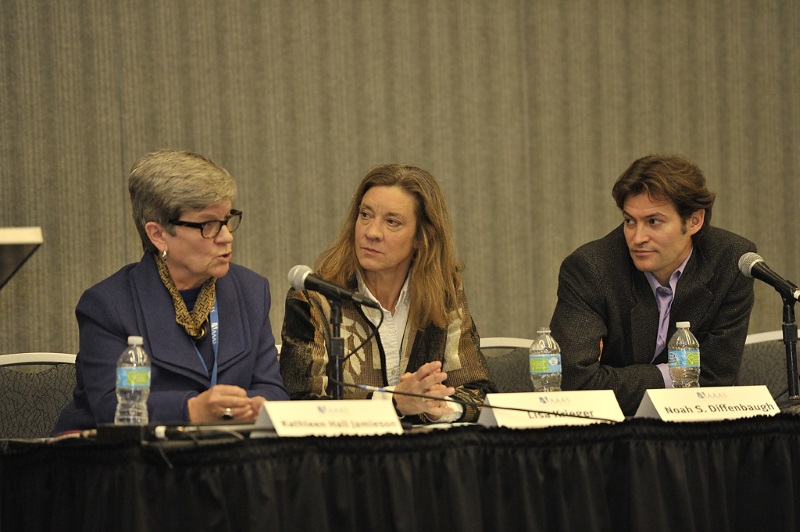Climate scientists inadvertently support the idea that they are partisans when they do not account for “inconvenient evidence,” Kathleen Hall Jamieson, director of the Annenberg Public Policy Center, told scientists and journalists gathered last week at the annual meeting of the American Association for the Advancement of Science in San Jose, Calif.
Speaking at a Feb. 12 AAAS panel, Jamieson presented several examples of climate reports by prominent scientific groups, including the AAAS, that ignored or downplayed evidence from 2013 showing that the extent of Arctic sea ice had increased when compared with 2012. Although the level in 2013 was part of a clear 35-year downward trend, some 2014 scientific publications chose to ignore it, which she called “a strategic mistake.”

Such omissions inadvertently “play into the ideological bias which says that scientists on climate are actually partisans who are not able to account for disconfirming evidence,” Jamieson said at the panel “Scientists Communicating Challenging Ideas,” which included Noah Diffenbaugh, an associate professor in the School of Earth Sciences at Stanford University, and San Jose Mercury News reporter Lisa Krieger. Jamieson added that the omission “makes it more difficult for [science] to communicate that the trend line is downward.”
In a study published last year, Jamieson proposed a communication model called LIVA — for “leveraging, involving, visualizing, analogizing” — which she said could help to more clearly communicate the evidence and overcome various biases. Such biases include “endpoint bias,” the tendency to overemphasize the last point in a trend line, and the tendency to overvalue recovery from a loss. The LIVA strategy, outlined in a study in the Proceedings of the National Academy of Sciences co-authored by Jamieson and APPC senior researcher Bruce Hardy, involves leveraging the credibility of well-accepted sources such as NASA, involving the audience in a visual presentation of the evidence, and using an analogy to make the conclusion clear.
The LIVA approach gets people involved in drawing “the best conclusion from the best available evidence,” Jamieson said. In the PNAS study, that approach was used with a group of self-identified conservatives who were shown a misleading online report by Fox News about the growth of the Arctic ice cap in 2013. But when members of that group were shown additional information using the LIVA method, they were better able to understand the context for the information and draw correct inferences about what was happening with the ice cap. Jamieson said the LIVA model worked well with liberals and moderates too.
Jamieson said the sources were key to the LIVA method. “The LIVA model only works if you have credibility,” she said. “So the reason this works with Arctic sea ice is NASA has credibility, granted by both liberals and conservatives.”
In other remarks, Jamieson:
- Said retractions of consequential, flawed scientific studies need to occur much more quickly. Scientists and journalists need to work together to get out the word about retracted work. A now-discredited study linking vaccines with autism took 12 years to be retracted and it remained as a cited science source until then. “If the retraction process had happened much more quickly and the journalistic community had done its job in conveying it we would, I think, not have had the [measles] problem we have today to the extent that we have.”
- Medical “ghostwriting” should be banned. In this practice, she said, an industry such as pharma drafts a scientific article and gets a scientist to attach his or her name to the study for publication — sometimes without knowing about all of the data collected. That problem occurred with later-retracted studies for Vioxx and hormone replacement therapy. Such ghostwriting should not ever carry “the brand of our legitimate academic institutions, and our sanctions have to be extraordinary when it happens.”

